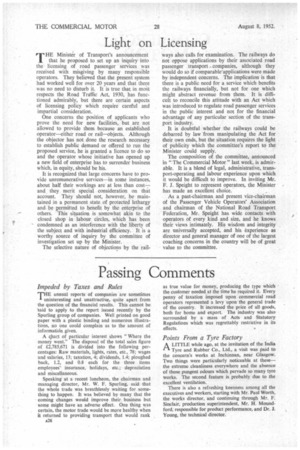Light on Licensing
Page 28

If you've noticed an error in this article please click here to report it so we can fix it.
THE Minister of Transport's announcement that he proposed to set up an inquiry into the licensing of road passenger services was received with misgiving by many responsible operators. They believed that the present system had worked well for over 20 years and that there was no need to disturb it. It is true that in most respects the Road Traffic Act, 1930, has functioned admirably, but there are certain aspects of licensing policy which require careful and impartial consideration. • One concerns the position of applicants who prove the need for new facilities, but are not allowed to provide them because an established operator—either road or rail—objects. Although the objector has not done the research necessary to establish public demand or offered to run the proposed service, he is granted a licence to do so and the operator whose initiative has opened up a new field of enterprise has to surrender business which, in equity, should be his.
It is recognized that large concerns have to provide unremunerative services—in some instances, about half their workings are at less than cost— and they merit special consideration on that account. They should not, however, be maintained in a permanent state of protected lethargy and be permitted to benefit by the enterprise of others. This situation is somewhat akin to the closed shop in labour circles, which has been condemned as an interference with the liberty of the subject and with industrial efficiency. It is a worthy source of inquiry by the committee of investigation set up by the Minister.
The selective nature of objections by the rail ways also calls for examination. The railways do not oppose applications by their associated road passenger transport . companies, although they would do so if comparable'applications were made by independent concerns. The implication is that there is a public need for a service which benefits the railways financially, but not for one which might abstract revenue from them. It is difficult to reconcile this attitude with an Act which was introduced to regulate road passenger services in the public interest and not for the financial advantage of any particular section of the transport industry.
It is doubtful whether the railways could be debarred by law from manipulating the Act for their own ends, but the situation requires the light of publicity which the committee's report to the Minister could supply.
The composition of the committee, announced in ".The Commercial Motor" last week, is admirable. It is a blend of legal, administrative, transport-operating and labour experience upon which it would be difficult to improve. In inviting Mr. F. J. Speight to represent operators, the Minister has made an excellent choice.
As a past-chairman and present vice-chairman of the Passenger Vehicle Operators' Association and chairman of the National Road Transport Federation, Mr. Speight has wide contacts with operators of every kind and size, and he knows their views intimately. His wisdom and integrity are universally accepted, and his experience as director and general manager of one of the largest coaching concerns in the country will be of great value to the committee.




















































































